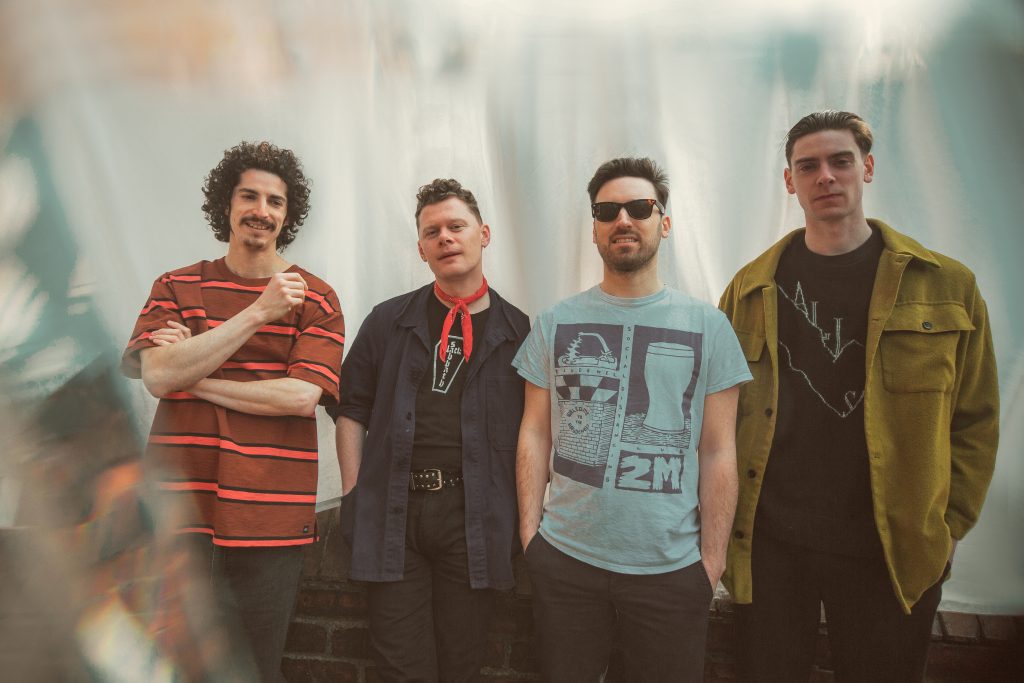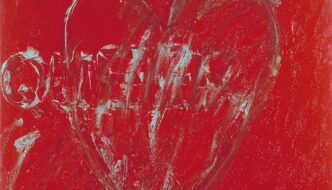
Photo credit: Emma Stone
From Hyde Park Book Club regulars to BBC 6 Music, Leeds-based jazz/instrumental band Vipertime are steadily grooving their way into the mainstream. Amassing a total of over 60,000 streams and currently embarking on a tour around the U.K, Vipertime has come a long way from the LS6 house parties where they first began. Formed in 2018, the band consists of Ben Powling, Matías Reed, Luke Reddin-Williams and George Hall. They describe their music as “combining the mesmeric forms and harmonies of 70s Addis with the ferocity of 60s Detroit”. The 4-piece band recently allowed us a glimpse into the inspirations for their music through crafting a playlist with a set of songs nominated by each band member; with a wide array of multi-cultural influences spanning from gothic, post-punk to esoteric, quirky pop.
Drummer/percussionist Luke Reddin-Williams’ selection of tracks begin with Metá Metá’s ‘Imagem do Amor’; a glorious blend of Portuguese vocals, a Brazilian ensemble reminiscent of Acoustic Ladyland. Reddin-Williams remarked that the singer, Jucara Marcal, “channels Serj Tankian from System of a Down”, another vocal powerhouse, in the track. ‘Imagem do Amor’ features a riveting face-off between the saxophone and drums, which accumulates in a fantastical union between the two instruments. The next track on the list is ‘Bhavayami Goralabalam’ by M. S. Subbulakshmi, who he credits as “arguably the most renowned Carnatic singer ever”. Reddin-Williams recalls that he stumbled upon the backing track when purchasing his own Mridangam and confesses, “it stuck in my head so much I had to track it down and found this version which I fell in love with immediately”. The next pick is a funk-pop fusion featuring some strong harmonies and rap, ‘Woo!’ by Remi Wolf. This song is testament to what Wolf does best; powerful vocals, unique sound and clever production. The last song is a 25 minute long track from Ganesh Kumaresh / Patri Satish Kumar / Trichy Krishnaswamy, titled ‘Naama Kusumamulache’. Reddin-Williams claims, that to him the virtuosic violin playing ”‘is some of the best in the South Indian Carnatic tradition”, and the first time he heard the track, it had him “shouting expletives of amazement” in his car. A fabulous microtonal display that accumulates in a grand trading finale with Patri Kumar on mridangam and Trichy Krishnaswamy on ghatam.
Bassist/guitarist Matías Reed dedicates his first track to Vipertime alumni, Azizi Cole, through spotlighting Xhosa Cole’s new release ‘All Roads’. Featuring Xhosa Cole’s iconic saxophone and percussion duets, this free-form jazz track is particularly enthralling due to its use of energising drums. Reed’s next pick, ‘The Dictator’ by Catherine Graindorge & Iggy Pop reveals the more dark and brooding influences on Vipertime’s discography. With use of spoken-word and synths, ‘The Dictator’ is hauntingly beautiful, with the standout being the eerie violin landscapes. The next track is another shoutout to a friend in the industry, a nasty jazz track from O. titled ‘OGO’. The wide variety of percussion is remarkable, with standout instruments being the heavy drums and the screeching saxophone which distorts throughout the track. Reed urges readers to attend one of the band’s gigs, praising them for an “incendiary live show”. Reed’s final pick is a track from one of his favourite bands, ‘ADAUGO’ by The Cavemen. He compliments how this song is a great example of how ‘The Cavemen’ expertly produces “lush highlife grooves rooted in the tradition”, portrayed by the rich, timeless harmonies and contemporary production on the track.
Drummer/percussionist George Hall’s picks begin with the “impeccably weird and wonderful” experimental piece from The Fergus Quill Trio, ‘Boris Hates Jazz… And That Suits Us Just Fine’. This piece, from Leeds-own renegade Fergus Quill, uses irregular time signatures and free-form piano to create, what Hall names a “fast-paced frantic tune” which “encapsulates [Quill’s] genius perfectly”. Hall’s following pick is ‘Hazel Frustration’ by “a good friend of the band”, Kindelan. Though Hall claims that Kindlean’s beautiful and expert use of harmonies and raw vocals are “present throughout all her music”, ‘Hazel Frustration’ in particular stands out as it possesses “that extra level of spice”, with a nod to Ed Allen’s production. Another dedication to the group’s South African inspirations, ‘Mama’ by Nduduzo Makhathini, a spiritual jazz piece praised as a “beautiful arrangement of [Makhathini’s] own tune”, accentuated by “euphoric vocals” and “transcended melodies” which cuts right through to the heart. Hall’s last selection is ‘Kora Sings’ by Sampha, which appeals to Hall due to the “level of quirkiness” which he describes as a rare find for an artist with such popularity. Sampha’s voice is “once in a generation”, according to Hall, with the unique production and pumping percussion serving as further standouts of the track.
Saxophonist Ben Powling rounds up the playlist with his selections, beginning with Nadine Shah’s ‘Out The Way’, a powerful pro-immigration track featuring trance-like, powerhouse vocals and gothic synths. Powling describes the track as “a slab of insistent, unsettling post-punk” and gives a shoutout to ‘saxophone hero’ Peter Wareham, who features on the track. Powling’s following pick is a noir jazz, spoken word track by Anthony Joseph, titled ‘Calling England Home’. To Powling, this track “summons the spirits of the Ethiopiques”. Joseph and Powling were first acquainted when they were on the same festival circuit, and Powling claims that watching Joseph perform most weekends “never got old”. Tamar Osborn’s Collocutor delivers a fiery version of ‘Black Satin’, one of Powling’s favourite electric-era Miles Davis tunes . Powling praises the percussion as “absolutely killer” and particularly enjoys how the horns “play call and response with the fragments of melody”. Powling’s penultimate choice is dedicated to “one of the unsung heroes of the tenor saxophone”, Steve Grossman. Selecting ‘Alodian Mode’ from Grossman’s debut album, ‘Some Shapes to Come’, Powling enthuses over how Grossman mines “a deep vein of Coltrane-isms” whilst still achieving a totally unique sound. A clear role model to Powling, Grossman came tearing out of the free jazz of the 1960s New York loft scene and into the fusion era via stints with both Miles Davis and Elvin Jones prior to his debut album. Powling’s final choice is ‘We Are All Prostitutes’ by The Pop Group. He dedicates this track to the late Mark Stewart, who he praises as a “visionary, agitator and icon”. ‘We Are All Prostitutes’ encapsulates what Powling loves most about the post-punk scene; bands maintaining the aggression and dissent of punk whilst drawing on dub, funk and free jazz. The Pop Group have been a huge influence on Powling and his music, with their anti-Thatcher lyrics proving to be” sickeningly relevant” even now.
From the influences of traditional Southern African music to eccentric, modern pieces with electrifying production, Vipertime have their ears tuned into a multitude of elevated musicians and tracks establishing them as musicians keep to learn from their predecessors as well as their peers. Vipertime credit their musical endeavours and development as a band to a number of these tracks and artists, with many of their own releases incorporating similar themes and techniques.
The band are currently embarking on a 10-date UK tour for their latest album, ‘Arise’, performing at esteemed venues such as The Old Blue Last in London and The Canteen in Bristol. The band will be returning to their hometown to perform at Hyde Park Book Club in Leeds on the 29th of May.
‘Arise’ is available to stream on all platforms, alongside the rest of the band’s discography, courtesy of HPBC Records.
***
To keep up to date on what Vipertime are doing, be sure to follow them on Instagram, Facebook and Twitter.
Filed under: Music
Tagged with: artist, band, gig, Hyde Park Book Club, influences, inspiration, jazz, leeds, Live Music, music, playlist, saxophone, spotify



Comments